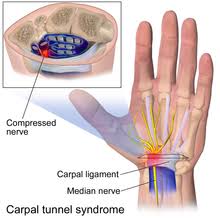
Carpal Tunnel Syndrome is a common condition that causes pain, numbness, and tingling in the hand and arm. This occurs when a nerve is compressed as it travels through the wrist.
Quick Facts
- Symptoms often start at night, as most people sleep with bent wrists.
- Don’t normally feel symptoms in the pinky finger, due to the nerve distribution pattern of the hand.
- The carpal tunnel is a small space at the base of your palm, toward the wrist, which is a shell of bones and ligaments, through which the medial nerve, tendons, and blood vessels, pass through on their way to the hand.
- Carpal Tunnel Syndrome (CTS) occurs as pressure on the median nerve increases, as it travels through the carpal tunnel.
Complexity of Symptoms
Symptoms usually start gradually. You may wake up from a sleep with the urge to ‘shake out your hand’.
- Burning
- Numbness
- Tingling
- Pain
- Cramping
Possible Causes & Risks
- Repetitive motions like typing, when poor ergonomics/alignment are common.
- Pregnancy – fluid retention, positioning, etc.
- Hypothyroidism
- Obesity
- Rheumatoid Arthritis
- Diabetes
Impact on Life
If not treated it can lead to:
- Decreased nerve impulses/signals.
- Complete loss of feeling in fingers.
- Weakened strength and mobility of the hand.
- Pain and muscle cramping.
Diagnosis
Early diagnosis is key, to minimize the impact and complexity of the functional troubles that can result from CTS. Some of the tests completed by health care professionals, to assist with a diagnosis of Carpal Tunnel Syndrome (CTS) include:
- Tinel’s sign
- By tapping or pressing on the median nerve with a reflex hammer, you may have increased symptoms, such as tingling and/or a ‘shock; feeling into the hand.
- Phalen’s Manoeuver
- By pressing the backs of your hands and fingers together, fingers facing down and flexed wrist, for 1-2 minutes you shouldn’t feel pain. But if you get a tingle or get numb it’s a sign of the syndrome.
- Two-point Discrimination Test
- Using a tool, the health professional will touch the skin at two different points at a certain distance. This distance where you feel a single point and not two will give the nerve function and compression (which are important elements of carpel tunnel).
Treatment
From stretches to surgery there are several options available.
- Pain Management:
- Wrist braces
- Soaking the hand in warm water as you flex and extend back and forth, 3-4 times a day.
- Asprin or ibuprofen
- Conservative Treatments, including Physiotherapy
- Thorough assessment of upper extremity, posture, ergonomics, function.
- Night splinting/bracing fitting & education.
- Individualized exercise prescription – stretching, strengthening, nerve gliding, etc.
- Ultrasound - high frequency waves and vibrations to ease the symptoms.
- Acupuncture.
- Education on activity modifications & self management:
In Spain, a research study divided 120 women with Carpal tunnel syndrome into two treatment groups where 1 received surgery and the other received physiotherapy. They both helped with better outcomes. Physical therapy did lead to better outcomes short term and the women learned and were having less pain and had better functioning compared to those who had surgery. (https://www.webmd.com/pain-management/carpal-tunnel/physical-therapy-for-carpal-tunnel-syndrome)
- Surgery:
- If other treatments haven’t helped; if the symptoms do not go away after 6months of other conservative treatments, surgery may be a suitable option.
- Open release surgery.
- Endoscopic surgery (1-2 smaller incisions; faster recovery; etc.).
Our Physiotherapists Can Help
If you are experiencing regular or increasing discomfort, talk to us. One of our experienced physiotherapists will assess you to develop an appropriate treatment plan for the problems you are experiencing now, and a preventative plan for the future.
